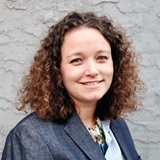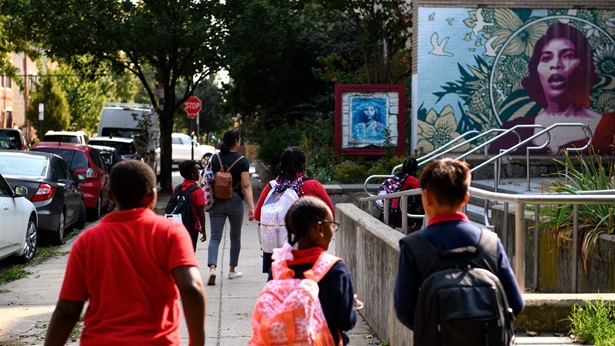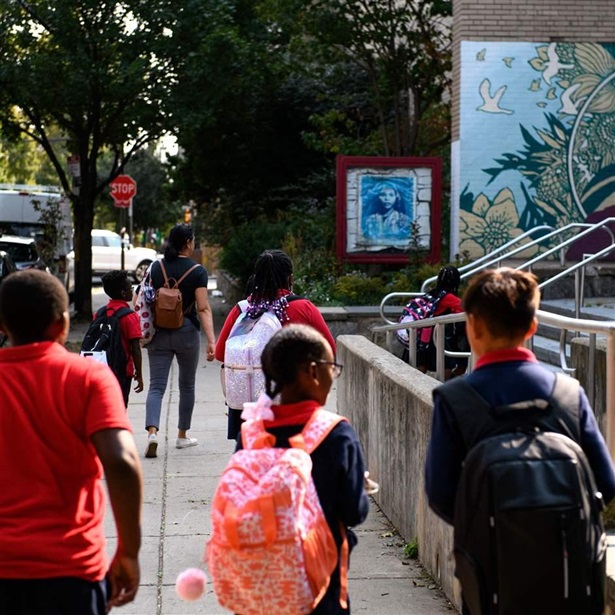Panel Examines Opportunities and Obstacles in Philadelphia’s ‘Year in Transition’
At Pew’s “State of the City” event, speakers explore what’s working well and what’s still needed on immigration, housing, and jobs

To mark the release of its annual “State of the City” report, The Pew Charitable Trusts held a wide-ranging convening on April 17, highlighting some of the 2024 report’s main findings. More than 100 people, including many civic leaders, attended the panel discussion, which was hosted by the event’s co-sponsor WHYY, the Philadelphia region’s leading public media organization.
Throughout the 90-minute conversation, participants cited several of the report’s more positive elements, including the fact that, as of 2023, the city had its lowest unemployment rate in three decades (4.2%), its highest job total in four decades (765,400), and a consistently growing percentage of adults with at least a four-year college degree (most recently, 36.3%). They also touched on some downside factors, including growing concerns about housing affordability and a poverty rate that, despite declining slightly to its lowest level in more than 20 years, remains above 20%.
The event’s title—“A Year in Transition”—reflected the theme of the report, and panelists cited some of the elements of that transition as reasons for optimism about the city’s future.
Donna Frisby-Greenwood, Pew’s senior vice president for Philadelphia and scientific advancement, told Sarah Glover, WHYY’s vice president of news and civic dialogue, that she sees in the presence of a new mayor, new City Council members, and new leaders at other major Philadelphia institutions the promise of fresh perspectives and a renewed willingness to tackle hard issues, with equity front and center.
Much of the evening was devoted to three panel discussions moderated by journalists from WHYY, covering immigration, housing, and access to jobs.
In the immigration conversation, Anuj Gupta, president and CEO of The Welcoming Center, said that the rising number of foreign-born residents, which played a dominant role in fueling the city’s rising population in the pre-pandemic years, has also been a key factor in some of the more promising developments documented in the report.
“If you look at the trends in higher educational attainment, if you look at the trends in workforce growth, if you look at the decrease—marginal, albeit—in the poverty rate, I will almost guarantee that if you peel back the demographics underlying those trends, you’ll find immigration in Philadelphia driving all three of those,” Gupta said.
He was joined on that panel by Kersy Azocar, president and CEO of Greenline Access Capital, who talked about the kinds of resources that immigrants need if more of them are to succeed in business.
In the housing conversation, three panelists—Jim Burnett, co-founder of Black Squirrel Collective; Maria N. Gonzalez, president of HACE; and Brian A. Hudson Sr., former executive director and CEO of the Pennsylvania Housing Finance Agency—talked about the current housing market, where costs have been rising faster than wages for renters and would-be homeowners alike.
For those seeking affordable housing, eligibility standards can be a problem. As Gonzalez noted, eligibility standards are generally based on the median income for the entire region, which is much higher than for the city alone. This can make Philadelphians with moderate incomes eligible for subsidized housing at lower-income residents’ expense.
Burnett said that building more housing in low-income neighborhoods would help but that several obstacles get in the way. One is that “95% of developers are White males” and that prospective developers of color lack sufficient access to capital, networks, and partnerships. Another obstacle, he said, is that city agencies, including the land bank, move too slowly in approving projects.
The jobs panel featured Theresa Y. Singleton, senior vice president and community affairs officer of the Federal Reserve Bank of Philadelphia, and Carlos Aponte, founder and executive director of We Love Philly.
In that conversation, Singleton, while acknowledging rising employment numbers in the city, focused on “the huge disparities that continue and, in some cases, are intensifying between Black households and White households.” One factor in reinforcing those economic disparities, she said, is what she called “occupational segregation,” especially in job training.
“Only 1 in 10 men are being trained for low-wage jobs,” Singleton added. “But when you look at women—Black women and Hispanic women, specifically—they’re being trained for lower-wage jobs in health care and personal care. About half of all Hispanic women and 40% of Black women are being trained for lower-wage positions. We’ve got to disrupt that if we want to change the future income and the prosperity of those households.”
Between the panels, the audience in the hall and those watching online were treated to spoken-word performances from three poets, all of whom have been fellows of The Pew Center for Arts & Heritage in years past: Yolanda Wisher, Ryan Eckes, and Denice Frohman.
Their highly personal takes on life in the city enlivened an evening dominated by talk about policies and statistics. As one panelist noted, data can sometimes blur the faces and voices of the people behind them. But the idea at the heart of the “State of the City” report is that numbers are an essential element in understanding where Philadelphia has been and where it might be headed.
“Data, research, public service, and valuing the dignity of all people have been in our DNA from the very beginning,” said Pew’s president and CEO, Susan K. Urahn, who opened the program along with her WHYY counterpart, William J. Marrazzo. “Pew will continue to partner with city government, with Philadelphia’s outstanding philanthropic and nonprofit communities, and with the people of this region to help find solutions to these problems.”
Larry Eichel is a senior adviser with The Pew Charitable Trusts’ Philadelphia research and policy initiative.
MORE FROM PEW
Explore Pew’s new and improved
Fiscal 50 interactive
Your state's stats are more accessible than ever with our new and improved Fiscal 50 interactive:
- Maps, trends, and customizable charts
- 50-state rankings
- Analysis of what it all means
- Shareable graphics and downloadable data
- Proven fiscal policy strategies
Welcome to the new Fiscal 50
Key changes include:
- State pages that help you keep track of trends in your home state and provide national and regional context.
- Interactive indicator pages with highly customizable and shareable data visualizations.
- A Budget Threads feature that offers Pew’s read on the latest state fiscal news.
















